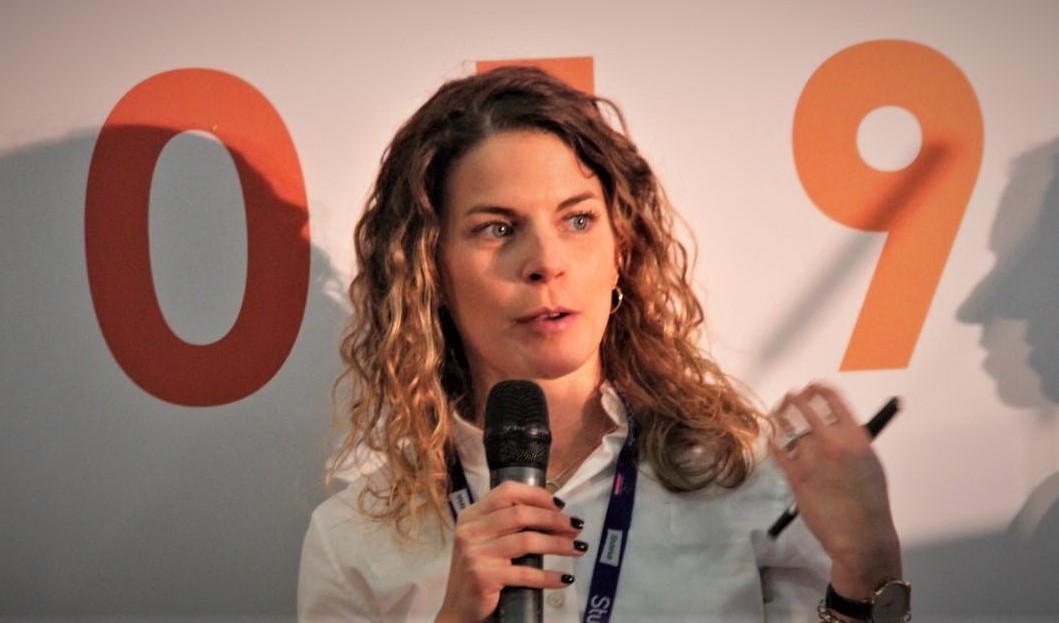In brief
In this timely contribution to the Joining the Dots series, Hannah Hoare explores the theme of power and inequality, describing the efforts that The Blue Thread are taking to redress the power imbalance between funder and grantee. Hannah reminds us that power can be used for good when it ‘creates and sits within a positive relationship’.

Hannah Hoare
Hannah is Executive Director of The Blue Thread. She previously worked at Social Finance, working with grantmaking trusts and foundations through the Impact Incubator. She started her career at the Department for Education and has also set up a successful international sports charity

Inequity of power drives social injustice. We have seen this play out graphically and violently over the past few weeks: George Floyd’s killing by a policeman in Minnesota is a horrendous illustration of gross misuse of power, while the Government’s defence of Dominic Cummings’ breach of his own lockdown rules demonstrates that those who have privilege also inherently enjoy power.
The Relationship Project’s discussions around our interactions with each other, with our communities, and with institutions have brought up questions of power and how we might seek a new balance.
Power is about the ability of someone, some thing, or some group, to have agency or impact that others cannot.
Working in the world of philanthropy, we seek to be conscious of our power, to share it where we can, and to use it to help others as far as possible.
Power in relationships: often unequal but frequently changing
Think about where you have experienced or observed good relationships: between teachers and pupils, employers and employees, parents and children. They do not necessarily share equal power, but neither is the power disparity glaring and uncomfortable, and neither is the balance constant. A teacher’s power is different when talking to a child in the classroom vs when they bump into the child with their guardian in the supermarket. And the best teachers use their power for good – to provide safe boundaries for their pupils, to guide them and point them in the right direction, and to advocate for and drive their pupils to achieve.
What seems to be important is that the balance of power is comfortable for everyone involved, and that it creates and sits within a positive relationship.
This is likely to mean that there is significant trust in both directions, and a belief – and demonstration – by both parties that each are ‘in it together’(!).
Power in grantmaking: we all need each other
In the world of grantmaking there is a growing movement (Grant Givers Movement, NPC, Bridgespan and Echoing Green, Lankelly Chase Foundation, #CharitySoWhite and others) arguing that the power disparity in our relationships with our grantees is way out of balance.
Grantmaking is an undoubted privilege and its power derives from the ownership of financial (and potentially other) assets, compounded by a tendency to downplay the importance of our partners (those receiving grants).
Without them, we could not do our work, create change, or fulfil our missions. They have knowledge, expertise, and skills that we do not have and perhaps under appreciate; acknowledging that in the way we work could start to rebalance some of the disparity, build trust in our relationships, and enable both partners to achieve more together.
How do we start to shift?
We need to allow ourselves to rethink the way we work as foundations. There is a tendency to do things the way they have always been done – to reuse lengthy applications forms, to repeat detailed due diligence, and to make arduous reporting requirements. While there is often good reason to reuse and add to something that seems to have worked before, many of these processes have become over-engineered and burdensome for both partners.
Risk aversion, the seeking of ‘objectivity’ – and a lack of trust – drives the trend to favour bureaucracy over humanity, instinct and empathy.
We should question whether our methods could be improved, adapted or changed. Should we ask more/less/different questions? Should we work together in different ways? Should we source information and influence from different sources? Are there are others we should work with? Are we allowing ourselves to be led as well as to lead? What do our partners think about how we work?
Finding a new way
At The Blue Thread we are seeking to create a relational process, supporting brilliant people with great ideas doing good work.
We build relationships with our partners so we can support them in a way which respects their knowledge, expertise, and reach; and which avoids burdening them with our requirements and needs.
We are learning this means we may have to go against our instinct to control what happens and resist our temptation to ask for detail and specificity. Instead we are seeking to trust good organisations with strong leadership to meet the needs of their community in the best way. We are at the beginning of our journey as a foundation, and we have been testing a few elements that we think go some way to rebalancing power:
1. Making unrestricted grants
We have done this almost entirely, even when we have discussed with an organisation a particular project they have in mind for those funds. They have the power to spend funds as they need: if their work changes or the way they want to deliver it flexes, they are free to do that. And more generally, partners can cover the essential core costs that are crucial but difficult to fund.
2. Finding organisations who might not find us
We have been taking a proactive approach, reaching out to mainly small community organisations who might not have found us and who might not have the capacity to make long applications. We have also asked our partners who else we should talk to; this widens the pool of people who influence where our support goes and shares some of that power with our partners. We let partners know when we have funded one of their recommendations, so that they can see the impact they had.
3. Minimising bureaucracy, building relationships
We have avoided creating forms or question lists for organisations as we know they can be both burdensome and a poor measure of organisational quality: good applications do not necessarily equal good provision, and vice versa. Instead we are talking to potential partners, looking to get to know them and their work, doing desk-based due diligence alongside, and making fast decisions about whether and how we could work together. By removing extractive, one-directional bureaucracy we hope to rebalance power through a more equal and less demanding process.
4. Understanding impact
Funders’ desire to know what difference ‘their’ money makes means that grantees must create attribution and artificial divisions in their work, and tries to appropriate the power that lies with grantees in terms of creating impact. As part of our relational approach we are looking to keep in touch via phone calls (and hopefully meetings in future) to hear how partners are getting on and what further support we might be able to offer. We are mindful of partners leading the timing of those conversations as far as possible so that we work to their timetable rather than ours. In a recent follow up conversation a partner showed us how we can help beyond our funding; we would not have got that from a written report. Recognising that feedback should be two-way, we also plan to seek their feedback on how we can be more helpful (on which we will look to Centre for Effective Philanthropy and Grant Advisor UK as starting points for best practice).
Rebalancing through action: reward requires risk
As an optimistic pragmatist, I am not inclined to let the perfect be the enemy of the good, particularly in something as crucial and as unmeasurable as this. As a small, private foundation we take an entrepreneurial approach, grasping our opportunity to take more risk than most. We accept that this means we might not always back the ‘right’ initiative or do the ‘right’ thing first time.
But we think we need to take risks to create change; if we get it ‘right’ all the time, we are not taking enough risks.
This journey may see us reflect at points that we have not used our power in the most helpful way, or that the way we used it led to an outcome we did not intend. Our pledge is to take time to reflect on where we might have got it wrong, and what we could do differently next time, as well as where things went well and why. Being open to change and influence by others will be key for any of us looking to travel on this essential journey.
